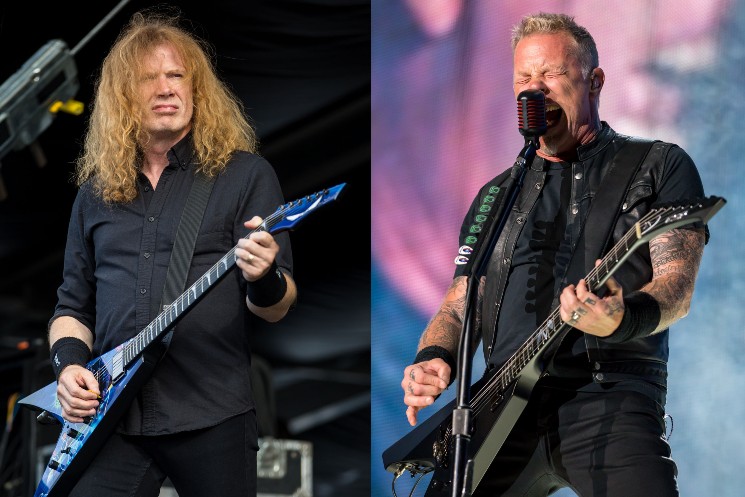It’s the confession heavy metal fans never thought they’d hear. After forty years of silence, heartbreak, and fire, Metallica’s James Hetfield has finally opened up about his explosive feud with ex-bandmate Dave Mustaine, the man whose departure birthed Megadeth and unleashed one of the most bitter rivalries in rock history. Now, in a startlingly candid interview, Hetfield admits the wounds “never really healed”—and the emotional fallout still haunts him today.

“The truth is, Dave’s pain has always been disturbing to me,” Hetfield confessed, his voice heavy with regret. “He never got over it—and maybe, in some ways, neither did I.”
The story began in 1983, when Mustaine was abruptly fired from Metallica, just days before the band began recording their debut album Kill ’Em All. Fueled by anger, humiliation, and revenge, Mustaine vowed to outdo his former bandmates—and from that fury came Megadeth, one of the fiercest acts in heavy metal. The move ignited a rivalry that would define the genre for decades, a battle fought not only in the charts but in every interview, every lyric, and every backstage whisper.
Hetfield, now 61, admits those early years were pure chaos—young, drunk, and combustible. “We were all out of control,” he said. “But Dave… Dave had a different kind of rage. It scared people. We couldn’t rein him in.” According to Hetfield, Mustaine’s drinking spiraled so badly that fights broke out almost daily. “We’d wake up with bruises we didn’t remember getting,” he recalled. “The tension was insane. We loved him—but we couldn’t survive with him.”
When Mustaine was sent home on a bus, replaced by Kirk Hammett, it should have been the end of the story. Instead, it became the birth of heavy metal’s greatest rivalry. For years, the two frontmen hurled insults through the media while their bands climbed to legendary heights—Metallica with Master of Puppets and The Black Album, Megadeth with Peace Sells and Rust in Peace. But beneath the bravado lay a deep ache neither man could silence.

Hetfield recalled their emotional confrontation in the 2004 documentary Some Kind of Monster, where Mustaine, trembling with resentment, told him: “You never even said thank you.” That moment, Hetfield says, cut deeper than any insult. “It hit me hard. We’d been fighting ghosts for so long that I forgot there was still a human being behind the anger. He just wanted to be acknowledged.”
For decades, the bitterness simmered—two titans locked in a cold war of pride and pain. Yet in recent years, something has changed. Hetfield’s latest comments show a man seeking peace, not vengeance. “Dave was a huge part of our beginnings,” he admitted. “Without him, there’s no Metallica. He shaped our sound, whether we liked it or not.”
Insiders say this rare humility marks a major shift in Hetfield’s outlook. After battling addiction and depression, the frontman has learned to view his past through a lens of compassion. “He’s tired of the hate,” one source close to him revealed. “He wants to close this chapter with grace. He knows how much damage it caused—for both of them.”

Meanwhile, Mustaine himself has recently softened his tone, even praising Metallica’s influence during Megadeth’s 2024 tour. The once-toxic rivalry may finally be thawing—though fans can’t help but wonder if a long-awaited reunion could ever happen. The internet exploded with speculation after Hetfield reportedly said, “We’ve all grown up. Never say never.”
As both bands continue to dominate stages across the globe, their intertwined story stands as one of music’s most powerful legends—a saga of betrayal, redemption, and creative fury. Hetfield’s revelation peels back the armor to reveal the human cost of greatness: two men forever bound by the fire that forged them.
In the end, their rivalry wasn’t just about ego—it was about passion, pain, and the unbreakable drive to be heard. And as Hetfield himself now admits, “We may have fought like enemies, but in some strange way, we’ll always be brothers.”
The feud that once divided the metal world may finally have found its peace—and in that reconciliation lies the most powerful riff of all.





